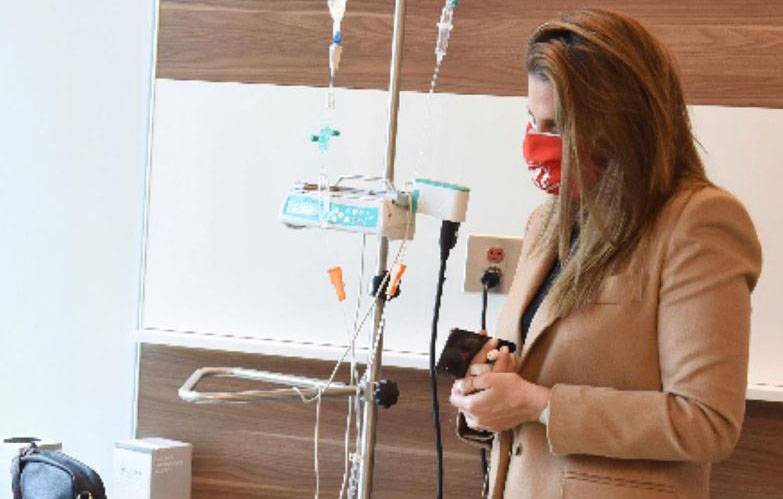Maya *, in her thirties, has suffered from cancer for several months. She is treated at the American University Hospital in Beirut (AUBMC), with help from the NGO Cancer Support Fund, affiliated with AUBMC. Except that this mother recently stopped the treatment for a week, for lack of drugs and equipment at the hospital. She resumed her care yesterday, the establishment having finally received donations of medicine. “I preferred to buy food for my 3 year old son, rather than buying something for me to treat. Besides, I don’t even have the means to get drugs or pay for exams, ”says Maya, whose treatment could not be found in Lebanon, whether through the usual pharmaceutical channels or on the black market. . Another dramatic situation which is added to the list of shortages facing the country and which endangers the hospital sector and the lives of cancer patients.
Maya and the 37 other cancer patients at AUBMC were fortunately able to resume treatment this week, thanks to donations from the King Hussein Foundation for the fight against cancer, chaired by Princess Ghida Talal, and a pharmaceutical company. . But if they had been forced to wait longer, the consequences could undoubtedly have been disastrous, warns Hala Dahdah Abou Jaber, president of Cancer Support Fund which she co-founded with Dr. Ali Taher, professor of hematology and oncology and director. from the Naef Basile Cancer Institute at AUBMC. “There is a risk of death when you stop this kind of treatment,” explains Ms. Dahdah Abou Jaber, whose association is funding the treatment of a group of patients. Some have tried to buy their medicine in Syria or Turkey, but it is very expensive. “A dose of the treatment used for colon cancer costs $ 3,400 which must be paid for in cash in view of the crisis, while a 28-day treatment recommended for leukemia is billed at $ 100,000. Hormonal therapy for breast cancer is not available in Lebanon, as well as serums to strengthen immunity or even anticoagulants, ”she says.
Appeal to the diaspora
Dr Ali Taher also recognizes that the situation is difficult, but he believes that the work should not stop. “The crisis is set to spread and some believe that it will take ten years for the country to recover. In the meantime, we must ensure the necessary treatments for the coming weeks and months. The country needs a long-term vision, but when it comes to human suffering, health professionals have no choice but to continue working, ”says the doctor. “I want to be positive, because if the worst were to happen, we risk a real disaster and a total collapse,” he adds. Faced with a situation that is likely to worsen in the coming weeks, the president of the NGO also calls on the Lebanese of the diaspora to come to the aid of the association. “It’s been a tough time for a while, but it got worse two weeks ago. The aid we have just received will allow us to continue for perhaps a month, but as long as the crisis is there we will find ourselves facing the same problem, ”indicates Hala Dahdah Abou Jaber. “We appeal for help to the diaspora, even to the international community,” she adds. Founded in 2018, Cancer Support Fund has already treated 590 patients and funded tests and consultations for 955 others.
* The first name has been changed.
To help the Cancer Support Fund, if you are abroad:
Donation to AUB-Cancer Support Fund
Banque: JP Morgan Chase Operating Account, New York, USA
Addresses de la branch: 4Chase, MetroTech Center, Brooklyn, NY11245
Bank routing number: 021000021
Swift code: CHASUS33
Account number: 005022622
Donations to Lebanon:
Citibank, NA Lebanon
Account Name: American University of Beirut
Transfer details: donation account
IBAN LB44 0115 0000 0000 0006 0022 4387
USD fresh funds 0600224387
Swift CITILBBE
Designation (Cancer Support Fund)
The King Hussein Foundation to the rescue
The Children’s Cancer Center of Lebanon (CCCL), AUBMC’s center for the treatment of children with cancer, has received a shipment of drugs not found in Lebanon provided by the King Hussein Foundation for the fight against cancer. CCCL works to provide free medical and psychological treatment to over 50% of children diagnosed with cancer.
–
Maya *, in her thirties, has suffered from cancer for several months. She is treated at the American University Hospital in Beirut (AUBMC), with help from the NGO Cancer Support Fund, affiliated with AUBMC. Except that this mother recently stopped the treatment for a week, for lack of drugs and equipment at the hospital. She resumed her care …

